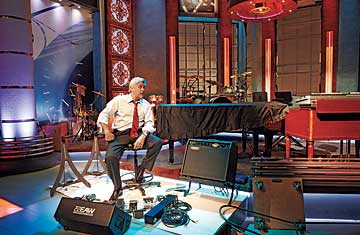
One challenge Leno, on his new set, faces is pleasing old fans without seeming to copy The Tonight Show.
(6 of 8)
Zucker says he believes there's still a role for big TV networks. "We know that the pipes still work," he says. "When we put on the Olympics, the Super Bowl, the Nightly News, the Today show, American Idol, millions of viewers come." I point out that none of his examples are comedies or dramas. "That's a fair point," he says. "Broadcast TV is definitely moving toward live, nonscripted events." If the Leno model is broadcast's future, it will mean less room for ambitious shows on the scale of Heroes and Lost. Says Rick Ludwin, NBC's executive vice president in charge of prime time and late night: "We're not the National Endowment for the Arts. This is a business."
But NBC's business is built on its history of acclaimed scripted TV from its '80s and '90s golden years (which lives on, in lower-rated form, on a few shows like The Office and Friday Night Lights). If NBC salvages its business model through cost-cutting, it could undermine its brand, both inside and outside the TV business.
"Nothing against Jay, but there are a lot of people in the industry who hope this fails spectacularly," says Shawn Ryan, who created The Shield for FX and executive-produces Lie to Me for Fox. To someone who grew up watching the glory days of NBC shows, Ryan says, "that used to be a special network. L.A. Law, Hill Street Blues, The Cosby Show, ER, Friends and Seinfeld--there was a whole generation of us that this was the network you turned on first. It's just sad. It seems like giving up."
Steven Bochco created Hill Street and L.A. Law, which made NBC synonymous with form-breaking drama in the '80s. Now he's making Raising the Bar, a legal series, for TNT, which airs a full schedule of summer dramas while the broadcasters are filling up on reality. Cable, he says, is where the opportunity and creative freedom are now. "I don't want to work for [the big networks]," he says, "and quite frankly, they don't want to work with me."
That said, Bochco doesn't blame NBC for giving Jay the 10 p.m. slot in today's business climate. Nor does the man who put Hill Street on the air, Fred Silverman. "You have to change with the times," he says. "They can't afford to keep spending $3 million an hour."
NBC says it's committed to airing The Jay Leno Show five nights a week for at least two years, good ratings or bad. The network gave Leno years to find his legs in late night, but in prime time, success is measured in scant weeks. The Jay Leno Show will almost certainly get a huge tune-in at first; research shows its awareness among viewers is twice that of a well-promoted new show. Does that mean it's a slam dunk? Ask Katie Couric.
Leno--who for all his laid-back attitude is as hard a competitor as he is a worker--seems energized by the challenge. No one can take his Tonight success away, but a host who analogizes himself to a quarterback has to be thinking of Brett Favre--the old pro who tried to stay in the game too long. Will The Jay Leno Show be the last TV show Leno does? "I have no idea," he says. "I'd like it to be." He pauses. "Probably. I mean, I'm 59. I'm glad I'm in a young man's game and competing, and that's all good. I don't like trying to act younger than I am. You just do what you do, and hopefully people will like it."
